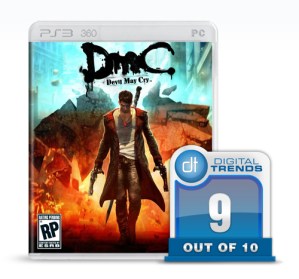 DmC: Devil May Cry has a lot in common with The Matrix. The former’s Dante uses his words more eloquently than the latter’s Neo, but both of these dudebros are blessed and cursed with the knowledge of a world that exists in parallel to the world that regular people know. Each world-behind-the-world is ruled by malevolent forces that both view humanity as a renewable resource. In the case of The Matrix, we are nothing more than batteries used to power a race of sentient machines. The key keepers in DmC, on the other hand, farm humanity for its souls. The particulars may differ, but the end result is the same: we are cattle.
DmC: Devil May Cry has a lot in common with The Matrix. The former’s Dante uses his words more eloquently than the latter’s Neo, but both of these dudebros are blessed and cursed with the knowledge of a world that exists in parallel to the world that regular people know. Each world-behind-the-world is ruled by malevolent forces that both view humanity as a renewable resource. In the case of The Matrix, we are nothing more than batteries used to power a race of sentient machines. The key keepers in DmC, on the other hand, farm humanity for its souls. The particulars may differ, but the end result is the same: we are cattle.
The comparisons don’t stop there either. Both Neo and Dante possess a unique set of skills that make them especially well suited to take on those responsible for keeping humanity in check. For us, the viewers – passive or active, it doesn’t matter – this translates to over-the-top action and a focus on spectacle. You can feel the beating heart of The Matrix behind every twist and turn of Ninja Theory’s franchise reboot in DmC: Devil May Cry. This immediately recognizable touchstone is, in fact, essential to nailing the underlying goal of any reboot: bring in a wider audience.
Dante’s In The Details
Major, major props to story supervisor Alex Garland, who returned to collaborate with Ninja Theory once again after his successful narrative delivery in 2010’s Enslaved: Odyssey to the West. The auteur writer behind revolutionary films like 28 Days Later and Sunshine is much more in evidence here than he was previously. Film-savvy gamers will immediately pick up on Garland’s presence in the initial introduction of Dante and the world that he exists in.
Credit Garland too for delivering a narrative that is easy to follow without being overly simple. Past Devil May Cry games have generally tended toward absurd, exceptionally convoluted plot structures. While the absurdity is still very much in evidence, most apparently in DmC‘s highly imaginative boss fights, the plotting is much more grounded and capably laid out than it has been before, especially for Western audiences.

In this rebooted take, Dante is still the Son of Sparda. He still has a twin brother named Vergil and both are still the unexpected result of an unholy union between demon and angel. Sparda is a traitorous demon in the eyes of those who fall in line behind Mundus, the ruler of the underworld and returning series antagonist. The difference in DmC is in the details, both the A-to-B-to-C progression of the plot and the world-building that serves to color in the rest of it.
The Limbo City setting is a generic metropolis that, much like the illusory world of The Matrix, exists to keep humanity complacent. Hidden away beneath the outward-facing veneer is a decaying wasteland of lost souls and demonic monstrosities. Dante and his brother are Nephilim half-breeds, which means they’re able to straddle between the two realities. There are also those like Kat, a member of Vergil’s resistance movement (The Order), who can project into the demons’ Limbo without actually physically crossing over into it.
Just don’t set your expectations too high. Garland and the writing team at Ninja Theory do a great job of keeping this accessible story on track, but this isn’t the sort of game narrative that wins awards. It’s blockbuster fluff set in the universe of an established franchise that is already known for its over-the-top spectacle. Once you’ve got an understanding of Dante and his background squared away – knowledge that even a marginally interested Devil May Cry fan could walk in with – you’re left with a high-concept plot that is built purely for the sake of entertainment. This is a great story in the same way that a blockbuster film like The Avengers can have a great story; it’ll keep you absorbed, but it won’t necessarily make you think. And that’s really okay.
Hell Is Where The Heart Is
The game that wraps around this story is, thankfully, a whole lot of fun to play. It’s fundamentally the same combo-focused brawling that has always been at the heart of the Devil May Cry series, with a few notable differences and tweaks. The biggest of these: DmC may well be the easiest game of bunch on its Normal difficulty setting. Your performance is still graded on a fight-by-fight and combo-by-combo basis, but it’s much easier to score grades of A, S, or higher than it has been before. The tougher Nephilim setting is more in line with the challenge level that earlier games threw up, while Son of Sparda – which unlocks after your first successful campaign playthrough – remixes both enemy placements and attack patterns.
The mechanics of gameplay are largely unchanged, with combos and combo-chaining still built around employing a mixture of light and heavy melee attacks alongside weaker ranged attacks from Dante’s various firearms. The big new element in DmC is the presence of Angel and Demon weapons. Unlocked early on, these two weapon sets can be activated at any time as combo modifiers by holding LT (Angel) or RT (Demon) as you attack. Switching from set to set and weapon to weapon (once you unlock multiple options for both, that is) is seamlessly integrated into combat, with many of Dante’s most potent combos relying on a mixture of Angel/Demon strikes and regular, old slashes with your trusty sword, Rebellion.

There’s more to this new wrinkle, however. Angel and Demon weapons also come with grappling capabilities, with the former working to pull Dante toward a target and the latter pulling a target in close. This turns out to be an essential tool both in combat and out of it. Larger and/or shielded enemies can have their vulnerabilities exposed with a little Demon tug. It’s similarly possibly to zip yourself between multiple aerial enemies using the Angel pull. The same principles apply out of combat with traversal puzzles using grapple points and concealed platforms.
All of these various elements come together around a perfectly paced 20-mission gauntlet — roughly 11-12 hours on Normal — that alternates between arena-based combat exercises, collectible-focused exploration, and scripted chase or escape sequences, plus the occasional boss fight or unlockable “Secret Missions,” the latter of which are hidden away behind locked doors that you must collect the keys to. Boss fights are particularly memorable too, with all except the underwhelming final encounter blending combat, traversal, pattern recognition, and wave-based survival in unique and unexpected ways.
Conclusion
Ninja Theory has delivered a take on Devil May Cry in DmC that ought to make series creator Hideki Kamiya proud. All of the franchise’s fundamentals are there, but they’ve also evolved. Between Garland force-feeding gamers the red pill in this Matrix-inspired story and Ninja Theory’s combotastic and intuitively implemented Angel/Demon tools, this new take on Dante is both more accessible and more flexible. It’s a perfect mix, and an outstanding start for AAA blockbuster gaming in 2013.
(This game was reviewed on the 360 using a copy provided by the publisher)


